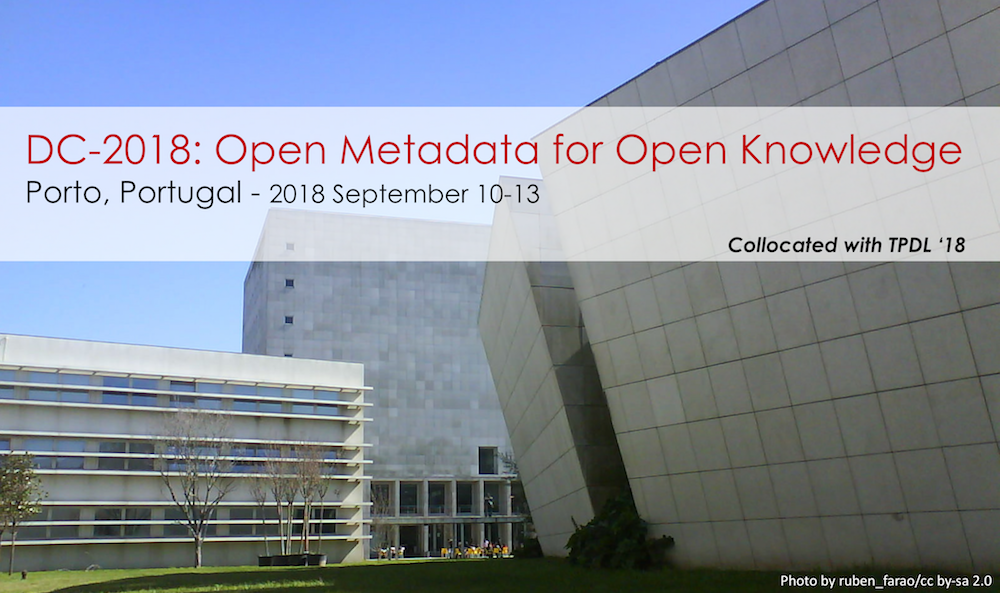Open Metadata for Open KnowledgeSeptember 10th - 13th 2018, University of Porto, Portugal |
Since the late 1990s, the Dublin Core community has worked predominantly with open standards, open data and open-source software. The advantages of openness have been recognized in areas such as open science, open education and open access to research outputs - in short, open knowledge.
The Dublin Core community has focused on the role of structured description (metadata) in finding and using this knowledge. The role of metadata has evolved over this last quarter-century with the rise of search engines, social media, crowdsourcing, Semantic Web, and machine learning alongside the traditional arts of metadata curation.
DC-2018 asks how metadata technologies and practices must further evolve to support open knowledge, often at scale, given current budget realities. Where do we need to innovate, and where do we need to consolidate existing good practice?
DC-2018 brings together researchers, teachers, students, practitioners and developers working with metadata for a few intense days of demonstration, discussion and collaboration. Dublin Core conferences draw not only from universities, libraries, and research institutions, but also commercial businesses working in the open knowledge space.
The Dublin Core community began in 1995 with the shared endeavour of creating 'simple' and interoperable metadata. Through the 2000s, emphasis shifted to enabling flexible metadata solutions based on multi-vocabulary application profiles and interoperability as Linked Data. Metadata developments of interest to the Dublin Core community currently range from vocabularies such as BIBFRAME, Schema.org, IIIF and Darwin Core, to WikiData processes and RDF validation languages such as ShEx and SHACL. Today's shared endeavour focuses on techniques, software, and best practices for creating, mapping, and maintaining semantically coherent vocabularies and, by extension, interoperable metadata.
DC-2018 is collocated this year with TPDL 2018. This fits DCMI’s tradition of working with other communities in its mission to increase interoperability and harmonisation in the development and application of metadata.
Join us in Porto, Portugal and participate in what is certain to be an interesting few days!
Beyond the focus of the conference theme, submission of papers, reports, presentations and poster are welcome in the following broad categories of metadata design, deployment and best practices:
- Metadata principles, guidelines, and best practices
- Curation, governance, and sustainability
- Conceptual models and frameworks
- Lessons from implementation
- Interoperability and harmonisation
- Metadata quality and validation
| Deadlines | |
|---|---|
|
|
General Submission Guidelines:
- Submission completeness:
- Papers and Project Reports must be complete works—abstract-only submissions will not be accepted (8-10 pages);
- Posters must submit complete abstracts (2-3 pages);
- Presentations must submit an abstract (1 page in text, Word, or PDF)
- Special Sessions, Workshops & Tutorials must submit a complete abstract describing the content and form of the session, session objectives, and brief biographical data of committed session personnel (2-4 pages);
- At least one author of an accepted submission must be physically present at the conference to represent and present the work;
- Technical format of all submissions must conform to the Publication Template guidelines for the submission category;
- All submissions must be in English; and
- All submissions must be through the DCMI Submission System (see "Step one of the submission process" link at the bottom of this page).
Submission Categories:
Papers (Peer Reviewed)
Full papers either describe innovative work in detail or provide critical, well-referenced overviews of key developments or good practices.
« Formatting Template » | « Track Policies »
- Session time allotted: 20-25 minutes
- Paper & presentation slides included in online Proceedings
- 8-10 pages
Project Reports (Peer Reviewed)
Project reports describe a specific model, application, or activity in a concise presentation.
« Formatting Template » | « Track Policies »
- Session time allotted: 20-25 minutes
- Project Report & presentation slides will be included in online Proceedings
- 8-10 pages
Posters (Peer Reviewed)
Posters are for the presentation of projects or research under development or late-breaking results.
« Formatting Template » | « Track Policies »
- Abstract & poster slide image will be included in the online Proceedings
- 2-3 page abstract
Presentations on Metadata
Presentations on interesting metadata topics in the areas of metadata services, development and deployment projects, in-process metadata exploration, and other innovative developments.
« Track Policies »
- Presenters will have approximately 20 minutes to present their topic with 20-30 minutes per session allocated for discussion
- Presentation slides will be included in the online Proceedings
- 1 page abstract in text, Word, or PDF
Special Sessions (including Panels)
Special Session are unique sessions of 90 minutes to a full day addressing topics of special interest to the Dublin Core community. The format of Special Sessions varies and may include combinations of speaker/panel presentations with discussion or mini-workshops.
« Track Policies »
- Session assets will be included in the online Proceedings
- 2-3 page abstract including bios of presenters/panelists
Workshops
Workshops engage participants in active work to address one or more well-defined problems or issues. Most frequently, workshops include both working in small- to medium-sized groups on aspects of the subject matter to be addressed or on the subject matter as a whole and the sharing of outcomes, conclusions drawn, and (sometimes) definition of future work.
« Track Policies »
- Session assets will be included in the online Proceedings
- 3-4 hours half-day or 6-8 hour full-day
- 2-4 page abstract
Tutorials
Tutorials are on a single topic, addressed at either an introductory level or in-depth, expert level and are intended to impart knowledge or skills and address identified learning outcomes.
« Track Policies »
- Session assets will be included in the online Proceedings
- 3-4 hours half-day or 6-8 hour full-day
- 2-4 page abstract
Submission Process:
Registration with DCMI Global Meetings & Conferences and login are required to submit items online and to check the status of current submissions.
- Already have a Username/Password for DCMI Global Meetings & Conferences? « Go to Login »
- Need a Username/Password? « Go to Registration »
Start here: « Step #1 of the Submission Process »
If you have difficulty with the submission process, email Paul Walk at paul(at)paulwalk(dot)net
Research Program Committee Chairs:
Kai Eckert, Professor, Stuttgart Media University
Mariana Malta, CEOS.PP, Polytechnic of Oporto, Portugal
Author Guidelines
Full Papers, Project Reports as well as Poster and Presentation extended abstracts are accepted for publication in the DC-2018 Conference Proceedings. Submissions for review may be submitted using Open Office (.odf), Microsoft Word (.doc) or Rich Text Format (.rtf).
In order to guarantee readability and uniformity of appearance, authors are expected to use the specifications in the table below in formatting their submissions. An MS DOC template is available below.
Reference to the « published proceedings for DC-2017 » may be of further assistance with matters of document formatting.
Maximum submission length for each category of submission as well as evaluation criteria are set out in the Call for Papers at « http://dcevents.dublincore.org/IntConf/dc-2018/schedConf/cfp ».
DCMI adheres to a blind peer review process in which reviewer identities are unknown to authors. It does not use a double-blind review process; therefore, author identities are known to reviewers.
Submission Formatting Specification
- Page size: ISO A4 (8.27 in x 11.69 in / 21 cm x 29.69 cm)
- Top and bottom margins: 1.18 in / 3 cm
- Left margin: 1.14 in / 2.9 cm
- Right margin: 1.13 in / 2.87 cm
- Header from top: .5 in /1.27 cm
The resulting single text column is 6 in / 15.23 cm
| Template Tag | Font | Size | Spacing |
|---|---|---|---|
| Header | Times Roman | 11 pt, Italic | Alignment: Centered Space before: 0 pt Space after: 0 pt Spacing: Single |
| Title | Arial | 14 pt, Bold | Alignment: Centered Space before: 12 pt Space after: 3 pt Spacing: Single |
| Author | Times Roman | 12 pt | Alignment: Centered Space before: 0 pt Space after: 0 pt Spacing :Single |
| Heading Abstract | Arial | 12 pt, Bold | Alignment: Justified Space before: 0 pt Space after: 0 pt Spacing: Single |
| Abstract | Times Roman | 11 pt | Alignment: Justified |
| Heading 1 | Arial | 12 pt, Bold | Alignment: Left Space before: 12 pt Space after: 6 pt Spacing: Single |
| Heading 2 | Arial | 11 pt, Bold | Alignment: Left Space before: 12 pt Space after: 3 pt Spacing: Single |
| Para Normal | Times Roman | 11 pt | Alignment: Justified Indent: first line: 0in/0cm Space before: 0 pt Space after: 0 pt Spacing: Single |
| Para Indent | Times Roman | 11 pt | Alignment: Justified Indent first line: .16in/.41cm Space before: 0 pt Space after: 0 pt Spacing: Single |
| Quotation | Times Roman | 11 pt | Alignment: Justified Indent right: .25 in/.635cm Indent left: .25 in/.635cm Space before: 3 pt Space after: 0 pt Spacing: Single |
| Caption Label | Times Roman | 9 pt | Alignment: Centered Space before: 0 pt Space after: 0 pt Spacing: Single |
Submissions for this conference were closed on 2018-09-09.
![]() DCMI's work is supported, promoted and improved by « Member organizations » around the world:
DCMI's work is supported, promoted and improved by « Member organizations » around the world:
 |  |  |
 |  |  |
 |  |  |
 |  |  |
 |
![]() DCMI's annual meeting and conference addresses models, technologies and applications of metadata
DCMI's annual meeting and conference addresses models, technologies and applications of metadata




